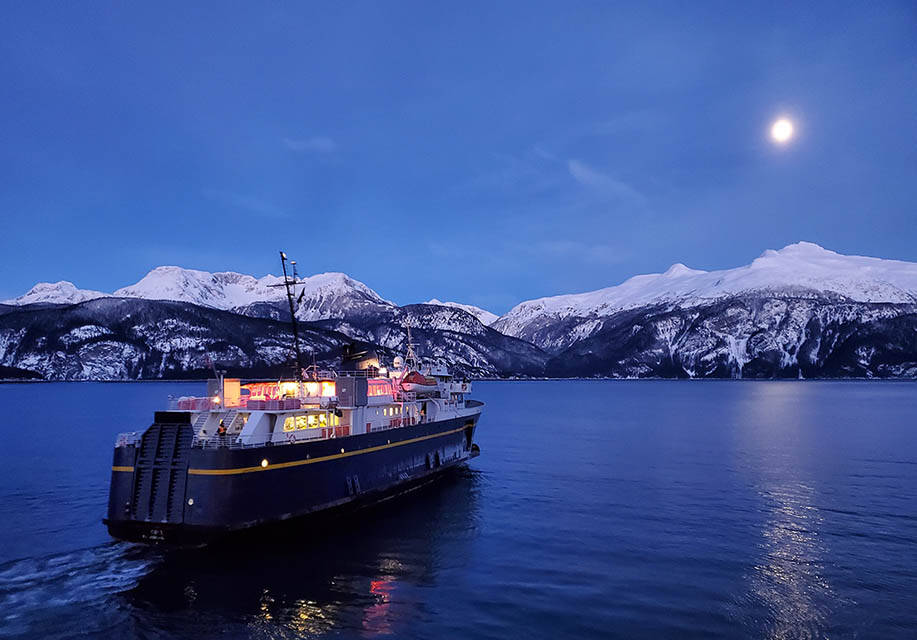“Before you can make a decision, you need information” Craig Tornga said while avoiding speculation about the future of the MV Matanuska. It’s been out of service for well over a year. Now the state is waiting for marine architects to submit the cost estimate for hull repairs due to higher levels of steel hull corrosion than anticipated. The decision they’ll make is whether to pay for the repairs or retire the 61-year-old ferry.
What Tornga may not yet realize is Gov. Mike Dunleavy has a history of making ill-informed decisions regarding the Alaska Marine Highway System.
For just over a year Tornga has been the marine director for AMHS. Before that he’d spent 26 years in the private sector where he helped keep executives informed of their operations. The impact losing a ship has on the company’s customers would be an important parameter of any business decision.
Dunleavy doesn’t care about AMHS’s customers. Despite telling Ketchikan residents that he had “no plan to hack, cut or destroy the marine highway system,” once in office he proceeded to do just that.
In his first year he cut the agency’s budget by more than 60%. He vetoed needed modifications to the two newest ferries. The MV Malaspina, which began sailing less than a year before the Matanuska, was permanently taken out of service due to its age and the estimated cost of repairs.
That was followed by selling the two fast ferries for a fraction of what it cost to build them 17 years earlier.
For Dunleavy the only thing that mattered was bringing spending in line with existing revenue. That meant budget cuts. In terms of percentage, AMHS got hit the hardest.
Needless to say, service to every coastal Alaskan community was severely disrupted. The system was so battered that in May 2020 the only ferry operating was on the route between Ketchikan and Metlakatla.
According to his commissioner at the Alaska Department of Transportation and Public facilities, Dunleavy’s second term would be different.
“Ensuring our communities have service, even when our mainline vessels are in overhaul, is crucial to our mission” Ryan Anderson wrote two years ago in an opinion published in the Empire. As an example, he described how the administration “took extra steps to fill the service gaps when the LeConte was in the shipyard” including contracting for “private passenger service in January and February to Angoon, Hoonah, Tenakee, Pelican, and Gustavus.” And even though they were ready to bring on “more private service if needed,” he said the “first choice is to sail our ships with our staff.”
A month after he wrote that, a state vacancy report showed only 40% of AMHS permanent staff positions were filled.
The shortage of maritime workers across the country contributed to the problem. But that’s not the whole story.
It’s hard enough to convince people to move to Alaska for work. But in a hot labor market, prospective employees have lots of opportunities to consider. And a significant factor in the choice they make is the reputation of potential employers.
Everything Dunleavy did to undermine the reliability of AMHS is likely a disincentive for them to work there. That includes the state’s payroll system problems that resulted in many crew members receiving their paychecks late.
That the system is broken isn’t news to residents from Ketchikan to Kodiak. Some independent travelers realized it after their trips were disrupted by canceled sailings. The frequency of problems reported by the news has made even more wary of booking ferry reservations.
Tornga inherited this mess. It was a good decision to cut back on marketing to outside travelers. Before that can resume, the state needs to fix its fleet so it’s stable enough for travelers to trust they won’t be stranded.
On the personnel side, we need a governor who understands that when the system was properly managed, the economic activity it generated was more than double the state subsidy. That’s why it never made sense for Dunleavy to prioritize budget cutting over ensuring reliable ferry service for coastal Alaskan communities.
And our next governor will need the patience to understand that it will take more than a few years for AMHS’s reputation to recover from the damage done by his incompetence.
• Rich Moniak is a Juneau resident and retired civil engineer with more than 25 years of experience working in the public sector. Columns, My Turns and Letters to the Editor represent the view of the author, not the view of the Juneau Empire. Have something to say? Here’s how to submit a My Turn or letter.

